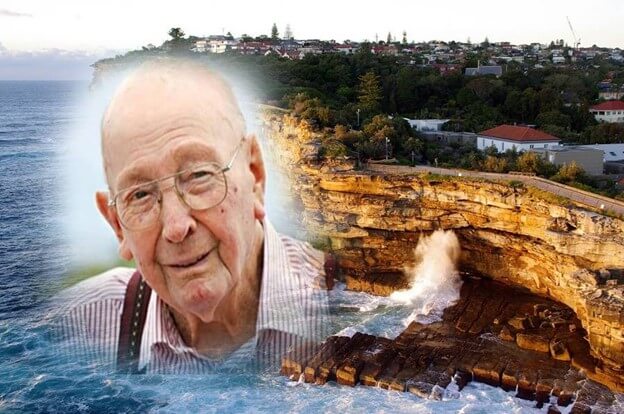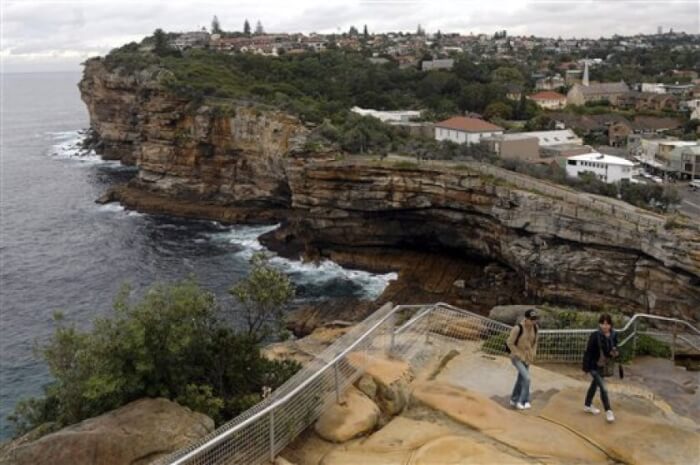The Angel of the Gap: the man who saved more than 160 people from suicide
For nearly five decades he gazed out of his Sydney home overlooking the Pacific Ocean, inspired by one of Australia's most picturesque views. But it was not just a love for the sea that drew him to the dramatic panorama.
Don Ritchie's window-watching had a far greater purpose. Since l964 he has saved at least 160 lives, though some say the true figure is much higher. Mr Ritchie, who died this week at the age of 86, was known as the Angel of the Gap, a title earned for persuading people not to throw themselves off the notorious Australian suicide spot.
A modest man who did not court celebrity or praise, Mr Ritchie would spot would-be suicides from his home and slowly walk across the road to them. At the cliff edge, he would simply smile and ask them, "Can I help you in some way?" More often than not the quiet approach worked, though on some occasions he risked his own life by physically restraining the more determined from making their final leap.
Afterwards, he would invite them back to his home for a cup of tea and a chat and occasionally they would return years later to thank him for saving their life. One survivor gave him a painting of an angel with the rays of the sun and the simple message: "An angel who walks amongst us."
"My ambition has always been to just get them away from the edge, to buy them time, to give them the opportunity to reflect and give them the chance to realise that things might look better the next morning," he once confided.
"You just can't sit there and watch them," he added. "You've got to try and save them."
Mr Ritchie's daughter, Sue, said her father enjoyed his ocean view, but was equally determined to watch out for troubled souls. He once said an offer of help "was all that was needed to turn people around and he would say not to underestimate the power of a kind word and a smile," she told the Sydney Morning Herald.
He was "a great mixture of strength and compassion... an everyday person who did an extraordinary thing for many people that saved their lives, without any want of recognition," she added.
Mr Ritchie was a seaman in the Royal Australian Navy during the Second World War and witnessed the Japanese surrender in Tokyo Bay in l945.
Back in Sydney he worked in the insurance industry. He would later tell friends of the people he had saved: "I was a salesman for most of my life and I sold them life."
For the past five years, he looked out at the Pacific Ocean from his home in Sydney, inspired by one of Australia's most beautiful scenery. But it was not just the love of the sea that attracted him to the dramatic panorama.
Don Ritchie's purpose of looking at the window is much greater. Since 1964, he has saved at least 160 lives, although some say the true number is much higher. Mr. Rich passed away this week at the age of 86. He was called the "Gap Angel", a title for persuading people not to leave the notorious Australian suicide site.
Like Beach Point on the Sussex coast, the steep cliffs of Sydney Harbour have long attracted those who have lost hope. But because of his calm voice and sympathetic attitude, Mr. Rich extended a helping hand to the desperate, letting them talk on the top of the cliff when they needed it.
Mr. Rich is a humble person who does not pursue celebrities or praise. He will find suicidal people in the family, and then slowly walk across the road to them. On the edge of the cliff, he would simply smile and ask them: "Is there anything I can help you?" Normally, the quiet method worked, although in some cases, he would risk his life by restricting his body. The more determined person makes the final jump.
Later, he would invite them back to his house for a cup of tea and chat, and occasionally they would come back a few years later to thank him for saving their lives. A survivor gave him a picture of an angel with the sun’s rays written on it and a simple message: "An angel walking among us."
“I always wanted to take them away from the edge, buy time, give them a chance to reflect and give them a chance to realize that the next morning everything could look better,” he once admitted.
Mr.Ritchie's daughter, Sue, said her dad loved the ocean view but was also determined to take care of troubled souls. He once said that offering help “is all it takes to turn people around for the better, and he said the power of a kind word and a smile should not be underestimated,” she told the Sydney Morning Herald.
He was "a great combination of strength and compassion ... an ordinary person who did an extraordinary deed for many people, saving their lives without lacking recognition," she added.
Mr Ritchie was a seaman in the Royal Australian Navy during the Second World War and witnessed the Japanese surrender in Tokyo Bay in l945.
Back in Sydney he worked in the insurance industry. He would later tell friends of the people he had saved: "I was a salesman for most of my life and I sold them life."
Don Ritchie's window-watching had a far greater purpose. Since l964 he has saved at least 160 lives, though some say the true figure is much higher. Mr Ritchie, who died this week at the age of 86, was known as the Angel of the Gap, a title earned for persuading people not to throw themselves off the notorious Australian suicide spot.
 Source: Internet
Source: Internet
A modest man who did not court celebrity or praise, Mr Ritchie would spot would-be suicides from his home and slowly walk across the road to them. At the cliff edge, he would simply smile and ask them, "Can I help you in some way?" More often than not the quiet approach worked, though on some occasions he risked his own life by physically restraining the more determined from making their final leap.
Afterwards, he would invite them back to his home for a cup of tea and a chat and occasionally they would return years later to thank him for saving their life. One survivor gave him a painting of an angel with the rays of the sun and the simple message: "An angel who walks amongst us."
"My ambition has always been to just get them away from the edge, to buy them time, to give them the opportunity to reflect and give them the chance to realise that things might look better the next morning," he once confided.
"You just can't sit there and watch them," he added. "You've got to try and save them."
Mr Ritchie's daughter, Sue, said her father enjoyed his ocean view, but was equally determined to watch out for troubled souls. He once said an offer of help "was all that was needed to turn people around and he would say not to underestimate the power of a kind word and a smile," she told the Sydney Morning Herald.
He was "a great mixture of strength and compassion... an everyday person who did an extraordinary thing for many people that saved their lives, without any want of recognition," she added.
Mr Ritchie was a seaman in the Royal Australian Navy during the Second World War and witnessed the Japanese surrender in Tokyo Bay in l945.
Back in Sydney he worked in the insurance industry. He would later tell friends of the people he had saved: "I was a salesman for most of my life and I sold them life."
For the past five years, he looked out at the Pacific Ocean from his home in Sydney, inspired by one of Australia's most beautiful scenery. But it was not just the love of the sea that attracted him to the dramatic panorama.
Don Ritchie's purpose of looking at the window is much greater. Since 1964, he has saved at least 160 lives, although some say the true number is much higher. Mr. Rich passed away this week at the age of 86. He was called the "Gap Angel", a title for persuading people not to leave the notorious Australian suicide site.
Like Beach Point on the Sussex coast, the steep cliffs of Sydney Harbour have long attracted those who have lost hope. But because of his calm voice and sympathetic attitude, Mr. Rich extended a helping hand to the desperate, letting them talk on the top of the cliff when they needed it.
Mr. Rich is a humble person who does not pursue celebrities or praise. He will find suicidal people in the family, and then slowly walk across the road to them. On the edge of the cliff, he would simply smile and ask them: "Is there anything I can help you?" Normally, the quiet method worked, although in some cases, he would risk his life by restricting his body. The more determined person makes the final jump.
Later, he would invite them back to his house for a cup of tea and chat, and occasionally they would come back a few years later to thank him for saving their lives. A survivor gave him a picture of an angel with the sun’s rays written on it and a simple message: "An angel walking among us."
“I always wanted to take them away from the edge, buy time, give them a chance to reflect and give them a chance to realize that the next morning everything could look better,” he once admitted.
 Source: Internet
Source: Internet
Mr.Ritchie's daughter, Sue, said her dad loved the ocean view but was also determined to take care of troubled souls. He once said that offering help “is all it takes to turn people around for the better, and he said the power of a kind word and a smile should not be underestimated,” she told the Sydney Morning Herald.
He was "a great combination of strength and compassion ... an ordinary person who did an extraordinary deed for many people, saving their lives without lacking recognition," she added.
Mr Ritchie was a seaman in the Royal Australian Navy during the Second World War and witnessed the Japanese surrender in Tokyo Bay in l945.
Back in Sydney he worked in the insurance industry. He would later tell friends of the people he had saved: "I was a salesman for most of my life and I sold them life."
Share this article
Advertisement